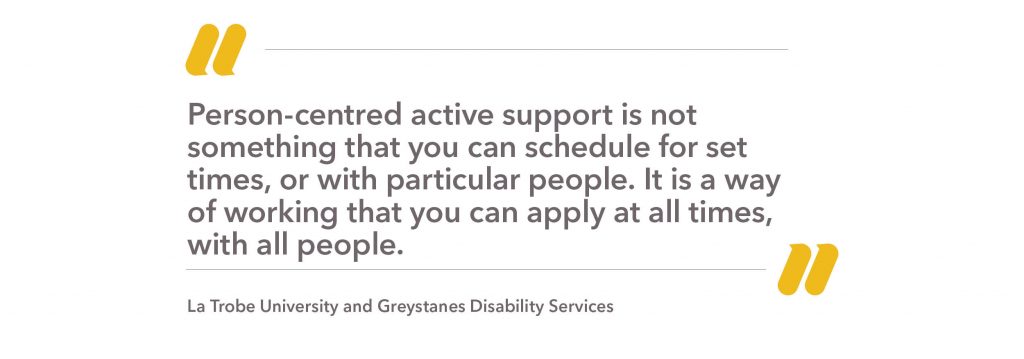Call us 1800 243 232
Call us 1800 243 232
In this session we will cover:
This module will take around 30 minutes to complete. At the end, you will be required to complete a short, comprehensive quiz.
Simply put, Active Support is a way of providing just the right amount of support so a person can successfully take part in their lives.
Active Support:
As support workers we should look for opportunities where we can support a person to be involved in all the activities of life.
Active Support includes:
Active Support is underpinned by key legislation, including the UN Convention on the Rights of Person with Disabilities, National Standards for Disability Services and the Disability Services Act 2011.
These documents have a human rights focus, they recognise that people with disability have the right to live a quality of life consistent with other people in the community.
Read Anglicare's Active Support policy
When we are doing good Active Support, the person with Disability is:
When we are doing good Active Support, staff are:
It is important because it has a direct impact on the lives of the people we support.
Active Support significantly improves quality of life by improving physical and mental health.

La Trobe University and Greystanes Disability Services describe person-centred Active Support as a way of working that enables everyone, no matter what their level of intellectual or physical disability, to make choices and participate in meaningful activities and social relationships.
As you watch this video make a list of the activities you see people involved in.
Group those activities into interests and hobbies, social interactions, household tasks and relationships. Some activities may fit in more than one group.
|
|
These are the four ways we think and work to make sure Active Support is happening. We will cover off each of these essential principles in separate training modules.
This means we look at every moment as a moment that has the potential for a person to be engaged or doing something for themselves. Even in the ordinary and mundane things we do.
This is about recognizing that everything that happens is made up of smaller parts. For all these smaller parts we are provide little amounts of assistance often, and giving people the chance to stop, take a break and then come back to an activity.
This means providing just enough assistance of the right kind, to enable a person to succeed in doing all, or part of a task.
This means providing opportunities for people to have choice and control over the many parts of their lives. The more choices a person can make the more control and input they have over their own life.